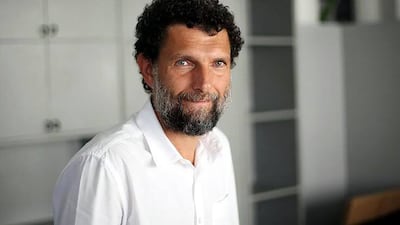A high-profile rights campaigner nearing his 1,000th day in a Turkish top-security jail has become the central character of a lockdown mini-opera featuring two snails he adopted after spotting them eating his prison meal.
Osman Bey and the Snails is both a tribute to rights campaigner Osman Kavala, 62, and a plea for his release from custody after he was arrested in 2017 on trumped up charges of plotting to overthrow the Turkish government.
The ten-minute opera was inspired by Mr Kavala’s tale of caring for the two snails in his cell at the Silivri top security prison, just outside of his hometown of Istanbul, that he recounted to his lawyer and was passed on to supporters.
After failing with other lobbying efforts to secure the businessman’s freedom, Nigel Osborne – a British composer, aid worker and friend of Mr Kavala - wrote the music that was turned into a ten-minute work by southwest England arts company Opera Circus.
“We had tried everything – so something different was necessary,” said Mr Osborne of the piece that features two singing snails. “The world can’t go on imprisoning innocent people. We can’t torture the angels.”
The piece was performed by artists from their homes while under lockdown during the Covid-19 pandemic and released last month.
It features characters playing Mr Kavala, his lawyer, his jailer, and the snails who appeared in his lunch of lettuce and rucola handed to him by an uncaring guard.
“I’m the snail in a jail, it’s all very boring,” sing the snails, Nadine Benjamin and Lore Lixenberg. “I can’t get to sleep because of Osman’s snoring.
“In some kitchen, we’d end up in a pot with garlic butter and seasoning. Our luck to be here with Osman a man of such honour and reason.”
Mr Kavala, a businessman and Turkey’s best-known supporter of culture, was accused in October 2017 of seeking to overthrow the government after organising a protest in Gezi Park, a green space in the centre of Istanbul that was earmarked for a shopping centre.
The protests in 2013 escalated and spread to several towns and cities in Turkey leading to the deaths of six people, including two police officers.
The European Court of Human Rights called for his immediate release in December 2019 after finding that he could not “reasonably be suspected of having attempted to overthrow the Government by force of violence”.
He was released from Silivri – taking with him the two snails - in February 2020 but was held in police custody while prosecutors successfully appealed against the ruling.
Mr Kavala was returned to the jail and passed the snails to his lawyer for safe-keeping. He remains in jail and will have spent 1,000 days there by the end of this month.
“They are trying to create a crime out of thin air,” said Milena Buyum, of Amnesty International. “By keeping him in prison, they are sending a message to civil society and human rights defenders to say ‘Look what we can do to Osman Kavala’.”
Mr Kavala has not seen the mini-opera but has been told about it by his lawyer and asked for it to include a statement from him in which he said he found the “snail’s lines quite realistic” but could not say the same about the prison conditions. “The guards and other employees here talk and act with civility,” he wrote.
Mr Osborne he was conscious that the piece should not worsen his friend’s plight. “It’s necessary that the world knows. On the other hand there a danger it can cause damage,” he said.


